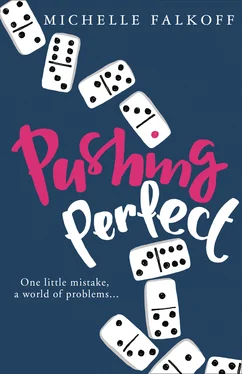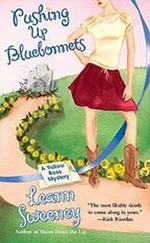“You were really young. And that was a good thing, because it was a very scary time. I was hallucinating and stopped sleeping. It was awful for your mother. She still doesn’t like to think about it.”
That did explain a lot, especially her emphatic “No!” when I’d asked her about beta blockers or Xanax. I knew lots of kids at school were taking them, but she wasn’t having it. The whole brain food thing was her way of trying to make up for it, which I appreciated.
“When do you need to get going?” Mom asked, watching me pour myself another cup of coffee.
“Not for almost an hour,” I said. “Can you pass me the crossword?” Better to keep my brain busy than to think about what was coming, I figured.
“Oh, I don’t think it’s here yet,” she said, not looking at me.
“Mom. They drop the paper off in the middle of the night. You bring it in every day. The one time it wasn’t here when you woke up, you called them to complain. I know you have it, so where is it?” I didn’t mean to sound irritable, but I could hear the edge in my voice.
She sighed. “Can you just skip the crossword for today? You can do it when you get home. You have enough to think about as it is.”
“Which is exactly why I need it.” Why was she being so weird?
My question was answered as soon as she pulled the paper out from under a stack of magazines and handed it over. Marbella was small enough that the newspaper was half the size of a normal paper like the San Francisco Chronicle . And we had so little crime that the front cover was usually devoted to something related to local politics, or high school sports. Or good news.
JULIA JACKSON, NATIONAL MERIT SEMIFINALIST, WINS SCHOLARSHIP!the headline screamed at me.
Oh, great.
I skimmed the article. Julia had won the Silicon Valley Entrepreneurship Society’s first annual prize, a ten-thousand-dollar-per-year scholarship to the school of her choosing. The prize was reserved for students of “exceptional promise,” the article read. “‘It’s a new award, but it’s a tremendous honor,’ said an admissions officer at UC Berkeley, who wished to remain anonymous. ‘It’s certainly the kind of thing we’d take into account when choosing between students.’”
It was like they’d written the article just to mess with my head.
“I think I can see the steam coming out of your ears,” Mom said. “That’s why—”
“—you didn’t want me to have the paper,” I said. “I get it. You were right. You’re right about everything.” I got up from the table and took my plate and cup over to the sink. “Thanks for breakfast. I’ll see you when I get home.”
“Honey, I don’t care about being right,” Mom said. “I won’t be here this afternoon, but I’ll see you when I get home from work. Call and tell us how it went?”
Figures she’d go to work on a Saturday too. Bad enough when it was just Dad. “Yeah, I’ll call. I’m going out tonight anyway.”
“Really? With who?” Mom sounded excited.
“A new friend. No big deal.”
“Well, you can tell me all about that too, when you get home. Don’t stay out too late.”
“I won’t,” I said. When had I ever?
Outside, the sun was shining and the sky was perfectly blue and free of clouds and it was like the day had been sent to mock me. I had a terrible feeling about how things would go; it would have been more appropriate for it to be raining. I got in my car and cracked an energy drink for the ride. It would probably be too much on top of the coffee, but I was too tired to do without it. By the time I got to school I was wired; I hoped that was the primary explanation for the jangling of my nerves.
Ms. Davenport was the SAT proctor, so the test was in her classroom. That was a good sign in more ways than one—all my associations with that room were positive. I’d aced lots of tests there, and just seeing Ms. Davenport at the front of the room was comforting. Maybe my feeling of foreboding was wrong.
Of course, the room was also full of seniors, since it was too early for even the most enterprising juniors to be taking their first shot at the test. But most of the kids in the AP classes I took had already taken it last year, so as I looked around the room, there were only a couple of really familiar faces.
Becca and Isabel.
Both of them were in their workout clothes, not much makeup, Isabel’s long blond hair in a high ponytail. Both of them had big Starbucks cups in front of them and matching energy bars. They must have met up beforehand and come together. I wondered whether they still had the same favorite drinks: skinny vanilla latte for Isabel, and matcha green tea for Becca. Isabel and I used to tease her for that one; it smelled terrible, and though Becca insisted it tasted better than it smelled, we both refused to try.
I still missed them.
I couldn’t let them get me off track, though. I had to concentrate on the good things: the luck of getting to be in this room, with its comforting smell of chalk dust; the fact that my usual class seat was open, so I could pretend this was just another test instead of the thing that was going to decide my whole life; the meditation exercises I’d practiced last night and that I had time to do now. So what if they hadn’t worked before? Today would be different. It had to be.
I closed my eyes and breathed naturally, in and out, focusing on each breath. My pulse slowed; I could see patterns forming on the backs of my eyelids, white dots swirling like kaleidoscopes against a dark-red backdrop, and let them soothe me. Ms. Davenport’s voice came into focus as she read the directions. I opened my eyes to see her passing out the exam packets.
I was going to be fine. I was ready.
Ms. Davenport gave the signal, and we tore open the seals holding our packets together. The first section was math, thank goodness. I started working through the early problems, the easier ones, and managed to get through five questions before I started feeling thumping in my head. Breathe, I thought. Focus. I calmed myself down enough to finish the section, which wasn’t too hard. Just like I’d practiced.
I was relieved to know I could do this.
The second section was critical reading. Two fill-in questions, no problem. The words started to go blurry when I got to some analogies, but I reminded myself to think of them like ratios. I slowed down and concentrated, using the techniques I’d learned from the study guide to narrow my options. All fine.
Until.
The first paragraph took up the entire left-hand column of the page. I started reading it and got halfway through before I realized I’d only taken in maybe every third word. Something about global warming? Rain forests? Endangered species? I started over. I still wasn’t getting it.
I held my thumb to the left side of my chin to check my pulse. It was speeding up.
My stomach clenched.
Beads of sweat formed on my forehead, even though I was really, really cold.
I looked back down at the test booklet and started reading the passage again. This time it was like I couldn’t even see the words.
Come on, I thought.
My lungs were getting smaller, making it almost impossible to squeeze breaths in and out of them.
I had to get out of here.
I looked up to see Ms. Davenport watching me, brows lowered. She tilted her head as if asking me a question. I stood up to tell her I had to go to the bathroom, but I’d waited too long. The patterns from the backs of my eyes were back, the white dots and the maroon behind them, except this time my eyes weren’t closed.
Then everything went dark.
5. Contents Cover Title Page Copyright Dedication FOR MY PARENTS Chapter 1 Chapter 2 Chapter 3 Chapter 4 Chapter 5 Chapter 6 Chapter 7 Chapter 8 Chapter 9 Chapter 10 Chapter 11 Chapter 12 Chapter 13 Chapter 14 Chapter 15 Chapter 16 Chapter 17 Chapter 18 Chapter 19 Chapter 20 Chapter 21 Chapter 22 Chapter 23 Chapter 24 Chapter 25 Chapter 26 Chapter 27 Chapter 28 Chapter 29 Chapter 30 Acknowledgments Keep Reading … Books by Michelle Falkoff About the Publisher
Читать дальше












